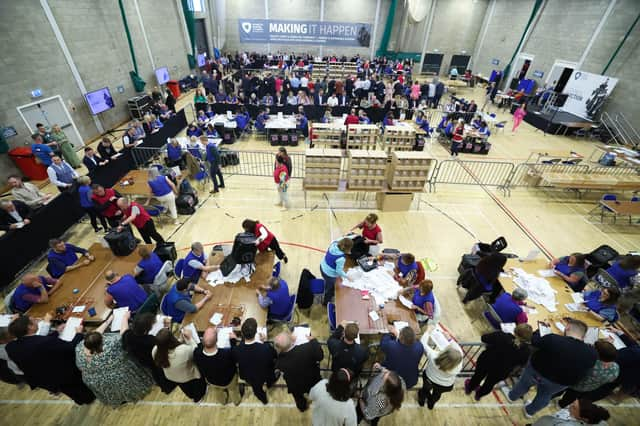Gerry Lynch: Despite tactical DUP success, the council election has been a historic victory for nationalists


Despite the relatively limited powers available to Northern Ireland’s councils, however, this one was.
For the first time, nationalist parties have clearly outpolled unionist parties, by a margin of 2.6% or 19,000 first preferences; and with nearly 31% of the first preference vote, Sinn Fein shattered its previous high-water mark in a Northern Ireland election.
Advertisement
Hide AdAdvertisement
Hide AdThe ‘greening of the West’ has been a Sinn Fein goal for a generation now. Last Thursday, they were the largest party in every electoral area west of the Bann with the sole exception of Limavady. They gained 39 seats for a total of 144.


The DUP was aware it was under pressure before the election, both from the TUV on its right flank and the likelihood of high nationalist turnout.
In that context, their outcome in seats was a tactical triumph, returning with 122 councillors, the same number as in 2019. DUP tacticians accurately assessed where they were under most pressure, and they held steady despite a small slippage in their share of the first preference vote to just over 23%.
This was despite the TUV adding nearly half again to their 2019 total to end up with just under 4%. Jim Allister’s party had a good day in his North Antrim heartland, but struggled to win seats elsewhere. With only nine councillors, they are bit players in most of Northern Ireland.
Advertisement
Hide AdAdvertisement
Hide AdThe main losses to unionism came from the Ulster Unionist Party, which shipped nearly a quarter of its 2019 vote share to finish with just under 11%, and lost 21 seats to finish with 54 councillors. The UUP seems to have something of an identity crisis – neither progressive enough to compete effectively with Alliance for liberal pro-Union voters in Greater Belfast and yet too liberal for what was once its rural heartlands. The party has changed both leaders and ideological direction repeatedly in recent years and yet never seems to find the right formula to stem its decline.
As for Alliance, they were the only other real victors of a difficult election for most parties. They recorded some impressive gains, especially in the Belfast suburbs and in the rural east, including in some heavily majority nationalist areas in County Down, to finish up nearly 2% higher than last time with just over 13% of the vote and 67 councillors.
They will be much cheered to win their first ever council seat in Fermanagh, but the loss of both their Londonderry seats in the face of the Sinn Fein surge is a symbolic blow. This was an election where Alliance consolidated its increase of recent years rather than seeing further gains.
The big longer-term issue for the party is, despite its impressively young cadre of new councillors and MLAs, whether it has anyone capable of replacing Naomi.
Advertisement
Hide AdAdvertisement
Hide AdThe SDLP had a bruising election, and is clearly now the fifth party in Northern Ireland with just 39 seats, 20 down on last time, and under 9% of the vote. Like the UUP, the party suffers from an identity crisis, with very different visions being presented by its devoutly Catholic and secular progressive wings.
Despite having some very impressive individual representatives in, for example, Matt O’Toole and Claire Hanna, they are the party with the deepest soul searching to do about the future.
The small parties of the left had a very poor election, with the Greens and People Before Profit both losing seats, capsized by the Sinn Féin surge.
Given that the DUP’s conservative election tactics saw it emerge with the same number of seats to four years ago, the idea of circling the wagons must be tempting for the broader unionist family. Yet strategically, this has only succeeded in consolidating the DUP’s dominance within a shrinking capital-U unionist market that now commands the allegiance of around 40% of the electorate.
Advertisement
Hide AdAdvertisement
Hide AdTo win a border poll, the pro-Union side will need to win tens of thousands of votes from Alliance supporters, and politically disengaged people, and people from ethnic minorities, and even from the odd nationalist and republican wary about how radical political change might affect their personal finances.
Unionism therefore faces two strategic questions.
One is, of course, whether the DUP should now re-enter government at Stormont. The status quo suits Sinn Fein, the only party entirely content for Northern Ireland to be a failure. For as long there is no executive in place, Sinn Fein can avoid making any difficult decisions or disappointing any groups it has made unrealistic policy promises to, and blame any upcoming cuts to public spending on the DUP and the British government.
The second strategic question for unionism is whether it exists to defend the Union between Northern Ireland and Great Britain or defend the interests of a particular community. Demographics are moving against the idea that the Union can be defended solely with the votes of the Protestant-Unionist-Loyalist community, but only Doug Beattie and Mike Nesbitt have attempted to solve that conundrum, neither with much success.
Unionism does have one advantage – republican complacency.
Sinn Fein believes that a united Ireland is inevitable, but there is no such thing as historic inevitability. The highest ever nationalist share of the vote was 45% back in the European elections of 1995.
Advertisement
Hide AdAdvertisement
Hide AdThere is a large bloc of soft nationalist and liberal unionist voters who are disappointed with Northern Ireland and still furious about Brexit, but not yet sold on the idea of rapid reunification with the Republic. Unionism has political agency and some control over the course of events but will survive neither endless drift nor a lack of realism about what Northern Ireland has become.
One final thing to bear in mind is that Northern Ireland’s public finances are in a mess.
Nobody should underestimate the impact of public spending cuts possibly amounting to £800 million, or 1.7% of total GDP, to a public-sector dependent region.
• Rev Gerry Lynch is a former Executive Director of the Alliance Party. A convert from Roman Catholicism he is now a clergyman in the Church of England